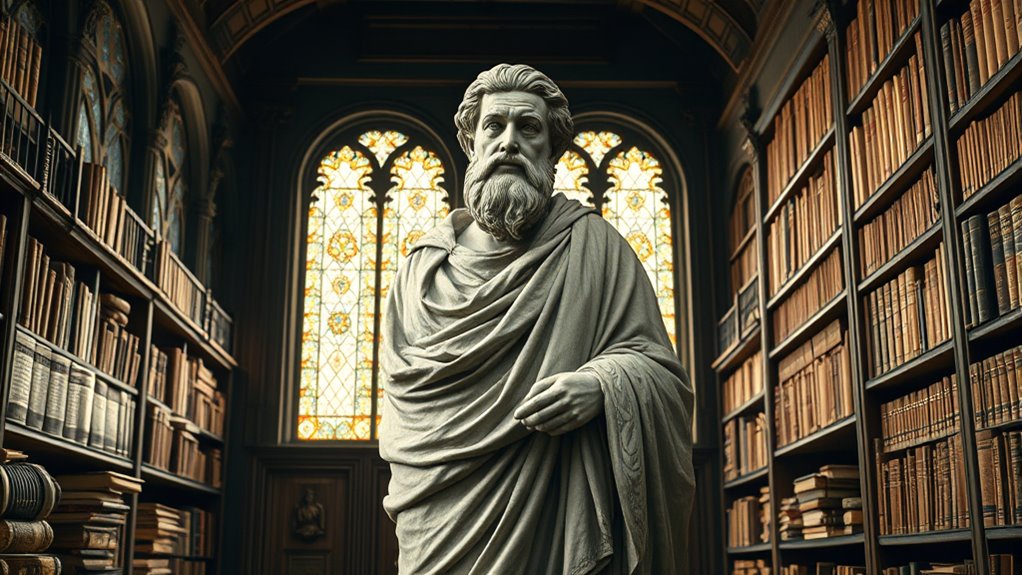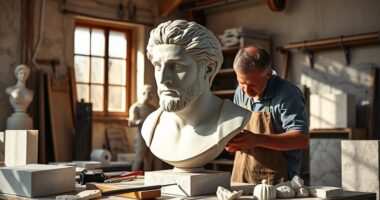Panaetius transforms Stoic philosophy across cultures by blending Greek ideas from Plato and Aristotle with Roman practical ethics. He makes Stoicism more accessible through daily habits, emotional regulation, and virtue cultivation, helping you apply its principles in everyday life. His focus on cultural exchange and political ties bridges Greek and Roman traditions, influencing later thinkers. If you’re curious about how these cross-cultural influences shaped philosophy, there’s much more to discover.
Key Takeaways
- Integrated Plato’s emphasis on soul harmony and Aristotle’s focus on virtues into Stoic ethics.
- Made Stoic principles more practical and accessible for daily life through actionable habits.
- Fostered cross-cultural exchange by building alliances with Roman leaders and translating ideas into Roman society.
- Shifted Stoicism from pure logic to practical ethics rooted in human nature and moral responsibility.
- Influenced later philosophical thought by emphasizing virtues, adaptability, and applying Stoic principles across cultures.
Bridging Greek and Roman Philosophical Traditions
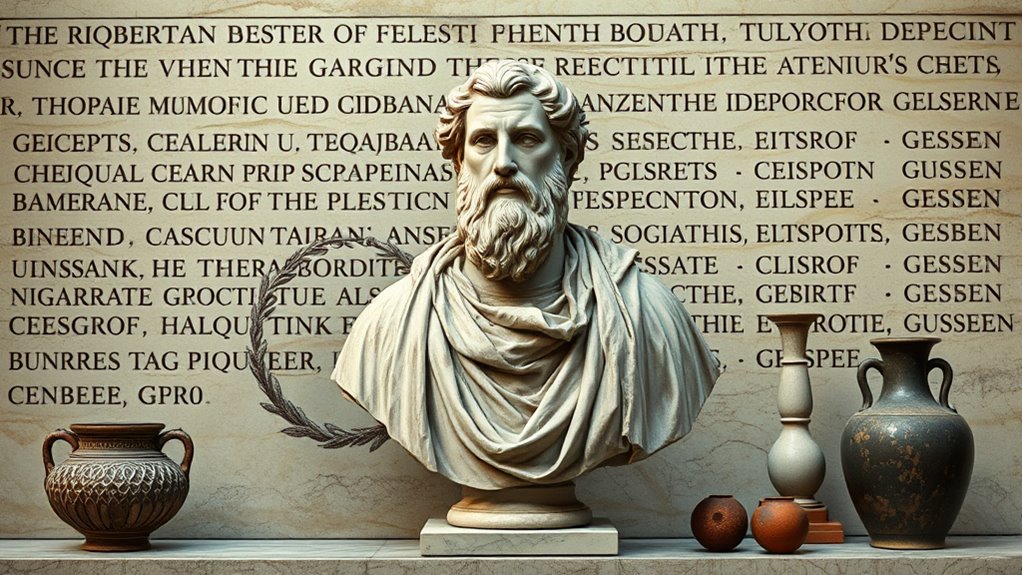
Panaetius played a crucial role in bridging Greek and Roman philosophical traditions by integrating teachings from Plato and Aristotle into Stoicism. This Greek Roman synthesis enriched Stoic ethics, making it more adaptable and relevant to Roman culture. He emphasized rationality and virtue, aligning Stoic ideas with the broader Greek philosophical landscape, while also addressing practical concerns of Roman society. By blending these influences, you find a more accessible Stoicism that balances idealism with real-world applicability. Additionally, his focus on ethical principles helped to make Stoic philosophy more applicable to everyday life and societal values. His approach helped shape a philosophical tradition that resonated across cultures, fostering a lasting legacy that bridged the ancient Greek and Roman worlds. The integration of financial management concepts such as virtue in moderation and prudent decision-making further grounded Stoicism in practical societal concerns. Furthermore, his emphasis on practical wisdom provided a framework for applying philosophical ideals to everyday decision-making and personal conduct. Recognizing the importance of emotional regulation in personal virtue, Panaetius encouraged balanced emotional responses as part of ethical living.
Integrating Platonic and Aristotelian Ideas Into Stoicism

How did Stoic philosophy evolve by incorporating ideas from Plato and Aristotle? You see, Panaetius led a philosophical integration that enriched Stoic ethics. He adopted Plato’s emphasis on the soul’s harmony and Aristotle’s focus on virtue as a means to achieve a good life. This blending shifted Stoicism from pure logic to a more practical ethics rooted in human nature and moral development. By integrating these ideas, you make Stoic principles more accessible and adaptable, emphasizing the importance of cultivating virtues through reason and action. Additionally, understanding ethical hacking principles can provide insights into moral responsibility and safeguarding human interests in modern contexts. This evolution allowed Stoicism to resonate across cultures, blending rationality with moral purpose, and was supported by a broader philosophical context that fostered cross-cultural understanding. Moreover, exploring inspiring words about personal growth can motivate individuals to embrace these integrated ethical perspectives. Furthermore, recognizing the influence of cultural exchange on philosophical development underscores the importance of cross-cultural dialogue in shaping ethical frameworks.
Making Stoic Principles Accessible to Daily Life

To make Stoic principles practical for everyday life, it’s essential to translate abstract ideas into actionable steps. Focus on practical application by breaking down virtues like courage, temperance, and wisdom into daily habits. For example, when facing challenges, remind yourself to accept what you can’t control and act with integrity. Cultivating everyday virtue involves consistent self-reflection and mindful choices that align with Stoic values. Incorporating mindful decluttering strategies can help create a more organized environment that supports mental clarity and emotional balance. Additionally, engaging with music therapy and sound healing practices can foster emotional resilience and mindfulness, reinforcing the Stoic emphasis on inner tranquility. Exploring virtual hackathons can also provide opportunities to develop problem-solving skills and innovative approaches that support mental agility and resilience. Recognizing the importance of mental health practices can further support emotional well-being and resilience.
Fostering Cultural Exchange Through Political and Personal Ties
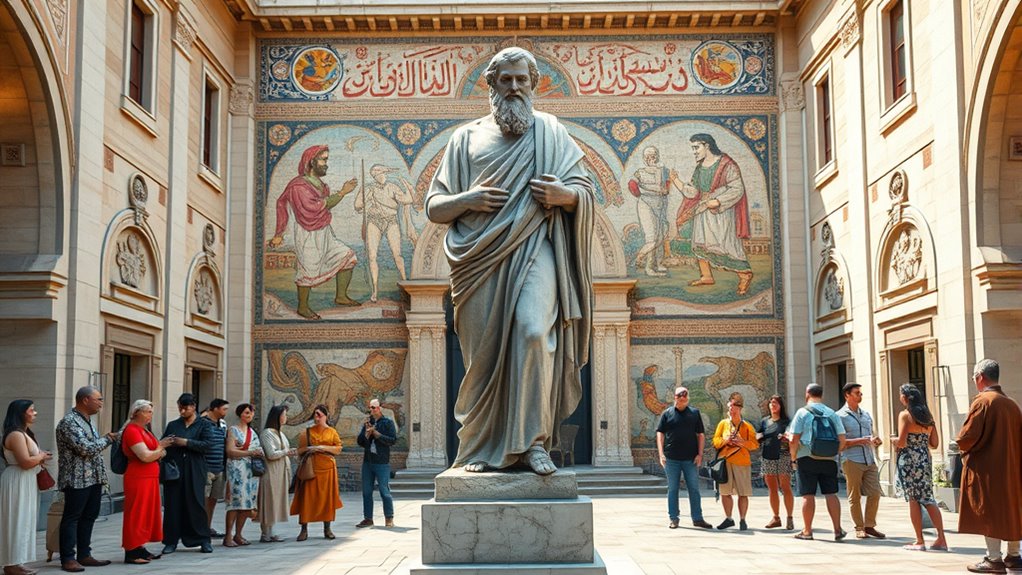
By establishing strong political and personal connections across Greece and Rome, Panaetius actively fostered cultural exchange that bridged different worlds. Through ancient diplomacy, he built alliances with Roman leaders, encouraging mutual understanding and respect. His personal ties to influential Roman politicians allowed him to introduce Greek philosophical ideas, facilitating cultural adaptation. These relationships helped translate Stoic principles into Roman contexts, making them more practical and relevant. Panaetius’s efforts created a dialogue between cultures, blending Greek intellectual traditions with Roman political life, and promoting a shared philosophical foundation that endured beyond his lifetime. Additionally, his diplomatic endeavors exemplify the importance of cross-cultural dialogue in shaping philosophical integration. His diplomacy therefore played a vital role in cross-cultural philosophical integration, supported by cultural exchange as a key method for fostering mutual understanding.
Enduring Influence on Later Philosophical Thought
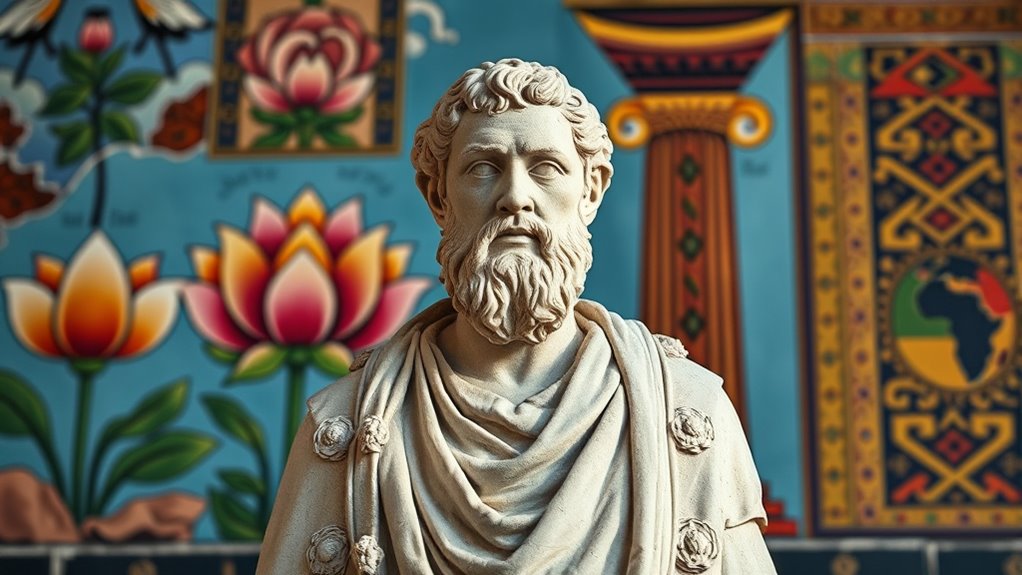
Panaetius’s ideas have left a lasting mark on the development of philosophical thought, shaping both Stoic ethics and Roman philosophy. His emphasis on practical virtue and the integration of Stoicism into daily life made these ideas more accessible and influential. Additionally, his engagement with crypto pump tools and strategies reflects a broader trend of applying philosophical principles to modern decision-making contexts, emphasizing the importance of discernment and practical wisdom. By blending Stoic principles with broader cultural values, he helped Roman thinkers adopt a more flexible approach, highlighting the importance of strength and resources alongside virtue. His contributions laid the groundwork for later Stoic philosophers and influenced Roman political thought, ethics, and the idea that philosophy should serve societal and personal well-being. Furthermore, his recognition of the significance of cultural adaptability allowed Stoic teachings to resonate across different societies and eras, reinforcing the universal relevance of his ideas. Panaetius’s legacy endures in how Stoicism continues to inform Western philosophical traditions.
Frequently Asked Questions
How Did Panaetius’s Background Influence His Philosophical Outlook?
Your personal background and cultural influences shape your philosophical outlook by grounding you in diverse ideas and experiences. Panaetius’s noble Rhodes origin and studies in Pergamon and Athens expose him to different traditions, making his approach more adaptable.
His close ties with Rome and blending of Greek philosophy with Roman culture allow him to make Stoicism more accessible, emphasizing practicality and relevance to everyday life.
What Specific Stoic Practices Did Panaetius Adapt for Everyday Life?
Imagine you’re adopting Panaetius’s approach to Stoicism in your daily routine. He emphasized practices like mindful journaling and cultivating emotional resilience.
You’d reflect on your actions, accept what you can’t control, and focus on virtues like patience and temperance.
Panaetius made Stoic principles accessible, encouraging you to incorporate these habits into everyday life, helping you stay calm, rational, and resilient amid modern challenges.
How Did Panaetius’s Teachings Differ From Earlier Stoic Philosophers?
You notice that Panaetius’s teachings differ from earlier Stoics by emphasizing ethical pragmatism and cultural adaptation.
Unlike traditional Stoics who focused solely on strict virtue, he believed happiness requires strength and resources.
He adapted Stoic principles to fit Roman and Greek cultures, making philosophy more accessible.
This shift helped Stoicism become practical for everyday life, blending ancient ideas with real-world applications for diverse audiences.
In What Ways Did Panaetius’s Roman Connections Impact His Philosophy?
Imagine a bridge stretching from ancient Greece to Rome, carrying vibrant ideas across waters. Your focus on Roman influence and cultural integration shows how Panaetius’s Roman connections shaped his philosophy, making Stoicism more practical and relatable.
Through his ties to Roman politicians and thinkers, you see how he blended Greek wisdom with Roman values, helping Stoic ideas flourish in new cultural landscapes, influencing political and everyday life across the empire.
What Are the Key Differences Between Middle Stoicism and Earlier Stoicism?
You’ll notice that middle Stoicism introduces moral flexibility and emphasizes emotional resilience more than earlier Stoicism.
Unlike the rigid focus on virtue alone, it recognizes the importance of resources and strength for happiness.
This shift helps you adapt to life’s complexities, balancing rational control with practical human needs.
Middle Stoicism makes the philosophy more accessible, encouraging you to develop resilience and moral flexibility in everyday situations.
Conclusion
You see how Panaetius bridges ancient worlds, blending philosophical ideas with everyday life. His pragmatic approach turns lofty ideals into practical tools, much like turning a distant storm into a guiding lighthouse. While ancient Greece and Rome seem worlds apart, his influence unites them—shaping a legacy that endures today. In this way, philosophy isn’t just theory; it’s a living, breathing force that navigates you through the complexities of life.
